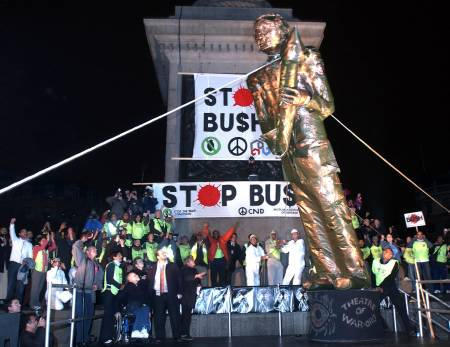![]()
Write us!
socialistviewpoint@pacbell.net
December 2003 • Vol 3, No. 11 •
200,000 March in London Against War on Iraq
 |
| An effigy of U.S. President George W. Bush is pulled down in Trafalgar Square, London, as part of a large protest over his state visit on Thursday. REUTERS/David Bebber |
Tens of thousands demonstrators marched through the heart of London on Thursday, toppling a 17-foot tall papier mache statue of President Bush to show their anger for the Iraq war and Prime Minister Tony Blair’s support of the invasion. As Bush and Blair vowed “not to flinch or give way or concede one inch” to terrorism in the wake of deadly bombings against British targets in Turkey, protesters said the close relationship between the two leaders made them deeply uneasy.
“We’re angry that Bush appears to be leading our country,” said marcher Ted Edwards. “Why Blair is allying himself to Bush I do not know.”
Many in the crowd said Thursday’s bombings in Istanbul, which killed more than two dozen people and injured hundreds, strengthened their resolve to oppose U.S. British policy in Iraq.
“There have been more and more bombings since the action in Iraq and more terrorism,” said Mischa Gorris, a 37-year old London lawyer. “You will never change the hearts and minds of terrorists by bombing them. This is what you will get.” Amid chants, the blast of foghorns and the beat of drums, protesters marched past the Houses of Parliament and through the heart of governmental London to Trafalgar Square.
The march took almost two hours to clear its starting point at the University of London. The Stop the War Coalition, which organized the march, said 200,000 people participated; the police estimate was 70,000.
As the work day ended, many people who had not marched joined a rally in Trafalgar Square, where the bronze painted statue of Bush was toppled to wild applause—a mocking reference to the toppling of Saddam Hussein’s statue after coalition troops took control of Baghdad on April 9.
After darkness fell, protesters burned their placards and the Bush effigy. At least three bonfires could be seen, with demonstrators sitting around them.
Opposition to the Iraq war, and Britain’s role as the largest partner of the United States, has been strong and vocal in Britain. The largest protest, in February, drew about a million people. Security, which has been tight for Bush’s state visit, was intense on Thursday, with more than 5,000 officers on duty in London. Rows of yellow-jacketed officers lined the march route.
Protests during Bush’s visit have been largely trouble free. Police said about 50 people were arrested on charges that included theft, drunkenness and drug possession.
As marchers chanting “George Bush, terrorist” made their way through a business district, a few scuffled with three Bush supporters holding U.S. flags and a sign saying “support America.” Police quickly intervened and bundled the three counter-demonstrators into a nearby building. “I think it’s a disgrace that these people are basically siding with Saddam Hussein and al Qaida,” said one of the three, Robert Temple of London. “Where were they when (former Romanian dictator Nicolae) Ceausescu came to town, and why aren’t they protesting against the people who blew up Turkey today?”
But some protesters said U.S./British policy in Iraq was helping fuel terrorist attacks.
“It wouldn’t have happened without Iraq. ... America is creating their own terrorists,” said Ziggy Dlabal, a German sociologist who lives in London.
Protesters said they were uncomfortable with Blair’s relationship with Bush. Some placards referred to Blair as Bush’s “poodle.”
The protests did not appear to faze the president.
“Freedom is beautiful,” Bush said Thursday, adding he was happy to be in a country where people were allowed to speak their minds freely. “All I know is that people in Baghdad weren’t allowed to do this until recent history.”
Write us
socialistviewpoint@pacbell.net